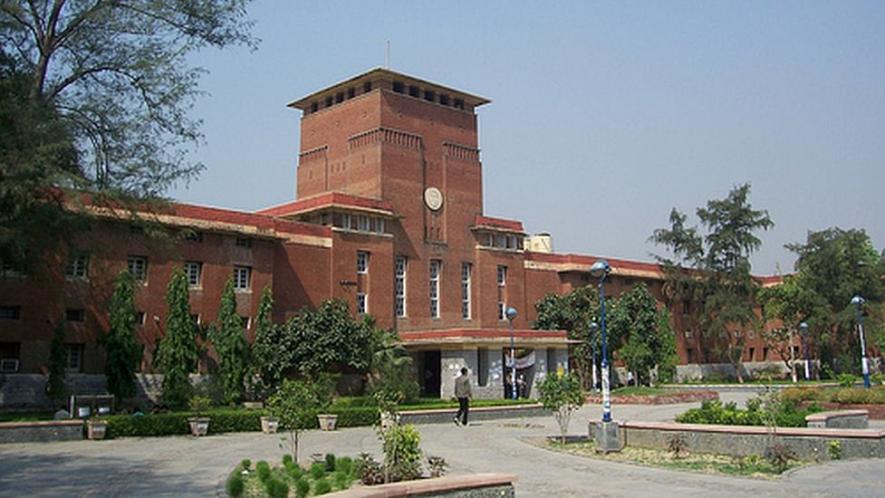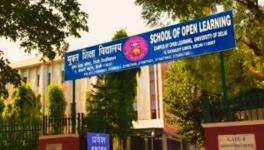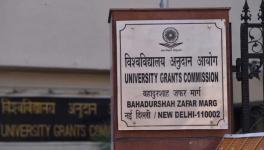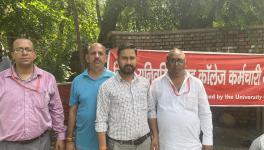Maternity Benefits for Ad-hoc and Contractual Staff in DU

Image for representational purpose. Credit: The Print
The Executive Council of Delhi University on Friday approved much-awaited maternity benefits to ad-hoc and contractual teaching and non-teaching staff after the move was overwhelmingly supported by the members.
The motion was placed before the Council after the committee with members from Campus Law Centre and Department of Social Work recommended that availing maternity leave is a basic and vital necessity for the physical and emotional well being of the mother and the child. “The committee envisages that the requirement of contractual engagement is a temporary phenomenon until the time regular recruitment is carried out. The committee, having recognised the possible financial implications of its recommendations, suggests that such financial issues, if any, may be addressed by the university/colleges as the case may be with the appropriate authorities,” said the committee.
The struggle for maternity benefits for the ad-hoc staff in the university has been a crucial fight as the university and its constituents have consistently denied the benefits – which has resulted in miscarriages and arbitrary termination of services. The Delhi University has been following the ad-hoc mode of recruitment in absence of regular recruitment to engage teachers to run the courses. Under it, a teacher is made to join the college after every four months.
However, this mode of recruitment has been vehemently criticised as it does not entail granting maternity and paternity leaves, sick leave, or study leave to the teachers. The university has been denying its ad-hoc staff maternity benefits from 2005 through its rules.
Manisha Priyadarshini, an assistant professor of English at the Aurobindo College, was removed from her services as she failed to join the college in March 2019. She had had to take an extended leave of two months following complexities in her pregnancy. Later, she was given relief by Delhi High Court which termed the termination of her services “unjustifiable”.
Welcoming the recent move, Democratic Teachers’ Front said: “[T]he Executive Council of DU today accepted the long standing demand of all teachers for paid maternity leave for ad hoc teachers and contract staff. This is the result of our collective, determined and unrelenting struggle for many years. The denial of this human right of teachers has finally come to an end. Our achievement of paid maternity leave is an important part of our struggle to preserve and develop public higher education as a democratic and inclusive space within which the teaching learning process can develop.”
Universal Entrance Examination
On the other hand, the council meeting has also cleared the universal entrance examination for admissions in the colleges. The teachers alleged that the move will lead to proliferation of the coaching industry and the candidates from disadvantaged sections of the society would be the worst hit.
Abha Dev Habib, former EC member, told NewsClick: “The experience of entrance examinations suggests that the questions have increasingly become specific. The students in this condition feel that access to coaching centres can help them crack it. In this case, the girl students will drop out because parents with less money will be hesitant to spend it. Moreover, the students will focus on cracking the tests rather than learning the basics.”
In a dissent note, EC members Ashok Agarwal and Seema Das said: "The data analysis on the basis of which this committee submitted its interim report is inadequate. This report takes into consideration only the academic session 2011-22, which is the pandemic period. Any need to change the tried and tested admissions process that has successfully churned out generations of bright and meritorious students can be justified only after consideration of data analysis for a substantial period of time. The committee in a very arbitrary manner labels CET as a procedure which will provide equitable opportunity. It ignores the increased pressure on students because of an additional examination for admission. The committee ignores the fact such a filter results in an additional expenditure towards coaching; therefore, marginalises those coming from disadvantaged backgrounds. Recently, the Madras High Court in a case of NEET has concluded that the entrance exam has benefited only students who spend lakhs of rupees on coaching classes and put rural students at a disadvantage. The Madras High Court has advised the Centre to take note of it."
Get the latest reports & analysis with people's perspective on Protests, movements & deep analytical videos, discussions of the current affairs in your Telegram app. Subscribe to NewsClick's Telegram channel & get Real-Time updates on stories, as they get published on our website.























